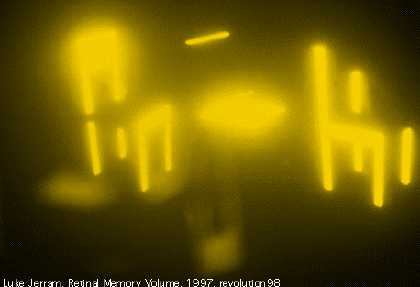Baby, Baby, Baby, Can I Have Your Number?
Revolution@ISEA98
 A refrain you may have associated with a retro love song not so long ago may now conjure up in your mind visions of convulsive social movements and supercomputers. Liverpool and Manchester are celebrating the birth of the computer age, and you are going to know about it. Baby, the stored program computer 'born' in Manchester in 1948, and Revolution, the effect Baby & Co. are said to have had on the world, are the icons of choice, designating 1998 as the year - of Revolution, of Change. If Manchester and Liverpool's culturemeisters have their say, '98 will go down in history as the year in which the North West region asserted its pivotal role, not only in world history - via its role in the industrial revolution and world trade - but also in the technological revolution that, they argue, is shaping our age. To this end, they have initiated what Eddie Berg - director of FACT, one of the principal organisers of ISEA98 - calls "A Triumph of Collaboration". Nearly all the performance and exhibition venues in the two biggest cities in the area are taking part, in addition to two major universities and numerous civic and organisational bodies, prompting Berg's recent press comment: "Can you honestly think of anywhere else in Britain where this level of cultural co-operation exists?"
A refrain you may have associated with a retro love song not so long ago may now conjure up in your mind visions of convulsive social movements and supercomputers. Liverpool and Manchester are celebrating the birth of the computer age, and you are going to know about it. Baby, the stored program computer 'born' in Manchester in 1948, and Revolution, the effect Baby & Co. are said to have had on the world, are the icons of choice, designating 1998 as the year - of Revolution, of Change. If Manchester and Liverpool's culturemeisters have their say, '98 will go down in history as the year in which the North West region asserted its pivotal role, not only in world history - via its role in the industrial revolution and world trade - but also in the technological revolution that, they argue, is shaping our age. To this end, they have initiated what Eddie Berg - director of FACT, one of the principal organisers of ISEA98 - calls "A Triumph of Collaboration". Nearly all the performance and exhibition venues in the two biggest cities in the area are taking part, in addition to two major universities and numerous civic and organisational bodies, prompting Berg's recent press comment: "Can you honestly think of anywhere else in Britain where this level of cultural co-operation exists?"
But why do these large-scale events always seem to come at a price? Requiring 'radical' ideas to ensure topicality, they remain hamstrung by administrative, financial and/or logistical considerations - all of which tend to gain the upper hand when the chips are down, befuddling agendas, causing creeping self-censorship and excluding potential participants. In the case of the ISEA, 1998 has produced some uniquely glaring contradictions. While a bombastic theme - Revolution/The Terror - asks us to consider the terms from every possible angle (psychosocial, technological, historical, philosophical, personal, emotional, you name it), the core events are aimed squarely at the academic and established art communities. Outdated and inflexible admission and pricing policies effectively hold sway (entrance fees are upwards of £150 for the conference and exhibition, although special places have been added for the 'representation' of 'minorities'). Elsewhere, the smell of defeatism hangs in the air - in this self-declared Digital Summer Revolution bombast shares the ring with Revolution fatigue.
What's it all about, Baby? In collaboration with Revolting, the temporary media laboratory of ISEA98, Mute 11 asks what the hell net.politics is anyway (p. 33), while on Metamute, Dr. Future and Graham Harwood recount their experiences of "one of the most prestigious events in the global electronic arts calendar".
[www.isea98.org][www.yourserver.co.uk/revolting][www.metamute.com/issue11/drfuture.htm][www.metamute.com/issue11/harwood.htm]
Mute Books Orders
For Mute Books distribution contact Anagram Books
contact@anagrambooks.com
For online purchases visit anagrambooks.com







